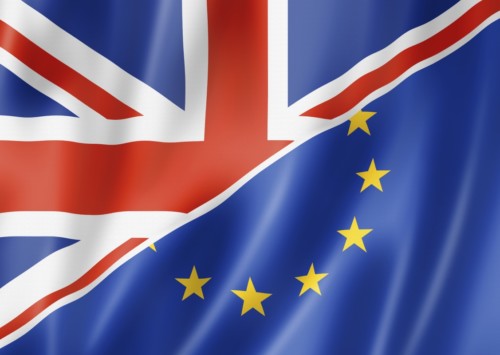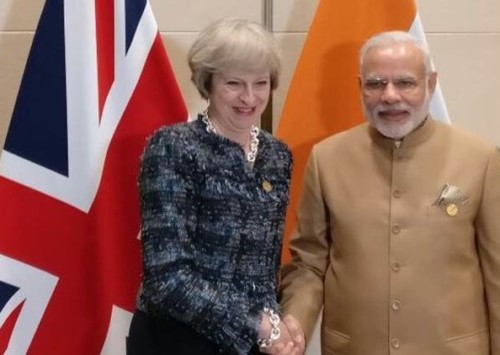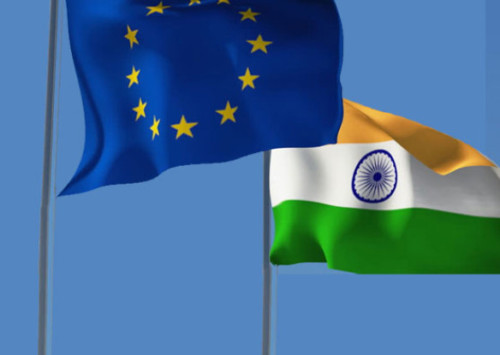Will Britain relax stringent visa rules for Indians?
Biz@India
British Prime Minister Theresa May was in India on a three-day visit beginning on November 6 and discussed the post-Brexit Britain’s relations with India and the way forward. She ended her visit with a trip to centuries old Shri Someshwara Temple at Halasuru in Bengaluru.
Clad in a gold and green saree, the UK Prime Minister, Theresa May left many surprised yet mesmerised.
The 5’6” Oxford-graduate, who turned 60 last month and the second woman after Margaret Thatcher to hold the office of Prime Minister, went around the temple with priests. Twitterati was abuzz with praises for the British premier’s ethnic ensemble.
A day after the British premier had left Indian shores, an active journalist on twitter went on to comment if Trump’s success in the US elections and demonetisation in India were not making news, May’s saree would have been trending!
May appeared elegant. That apart she did not give much to the Indian side like a true politician even though both India and Britain discussed more than half a dozen issues.
The highlight of the summit meetings between Theresa May and her Indian counterpart, Narendra Modi, included terrorism, exchange of a list of fugitives, extradition issues, business deals, masala bonds to be raised by Indian state-owned enterprises in London, Britain’s support to India for the permanent seat in the UN Security council, trade and commerce, smart cities, infrastructure financing and visas for Indian students.
May described the potential of the relationship with India and its market of 1.3 billion people as “limitless”. To expand commercial opportunities for both the countries, Britain also agreed to invest GBP 120 million in a joint fund that will support private sector investment from the city of London to finance Indian infrastructure. “This is a vote of confidence in India’s growth story. And vote of confidence in London as the world’s leading financial centre,” she noted.
Greener Pastures
New Delhi and London agreed to strengthen co-operation to tackle the use of internet by extremists and to reduce radicalization and online recruitment attempts. “We both face a shared threat of terrorism as individual countries, as partners, and as global powers whose interests lie in a stable world, founded on the rules-based international system,” May told Prime Minister Modi.
The two Prime Ministers also tasked the Defence Consultative Group on November 15-16 to advance the bilateral defence cooperation agenda, including the UK’s proposals for capability partnerships through a range of activities including military-to-military cooperation, training, and exchange of subject matter experts, research and technology linkages as well as defence manufacturing. The two sides signed two documents pertaining to ease of doing business and intellectual property rights.
Apprehensions remain strong
Even as Britain looked forward to business opportunities in India such as building of smart cities and defence procurements, did PM May address the concerns of India enough? Not really, from what emerges from the press briefings and views expressed elsewhere.
This is reflected furthermore by the rigid position taken by Britain on visa issue for Indian students.
To curb its soaring immigration, United Kingdom made changes to its visa policy for non-EU nationals two weeks back, which will affect a large number of Indians especially IT professionals. Anyone applying for a visa would be required to meet a higher salary threshold requirement of GBP 30,000 from the earlier GBP 20,800.
By promising preferential visas and immigration opportunities for high net worth individuals alone, and nothing for students and IT professionals, May has also not addressed her country’s skills gap.
At an ‘India-UK Tech Summit’ attended by both prime ministers, PM Modi stressed that education was vital for Indian students and it would define the country’s engagement in a shared future with the UK.
“We must therefore encourage greater mobility and participation of young people in education and research opportunities,” he said, speaking before his bilateral meeting with PM May.
In her bilateral meeting with PM Modi on November 7, PM May sought to link the issue of ‘illegal’ Indian immigrants with PM Modi’s demand for more student visas. But the British side has so far failed to provide statistics that showed that Indian students are more likely than students of other nationalities to overstay.
Though Indians cherish a British tradition when it comes to modern scientific and higher learning, many have been left disappointed.
India’s Commerce and Industry Minister, Nirmala Sitharaman remarked, “I did raise the issues of visa fees, student visas, and how Indian students no longer prefer to go to the British universities, which was the top priority earlier, because of the nature of visa regulations and requirements they have to go through.”
As the UK visa regime discourages many Indian students from going to Britain, they now prefer other destinations such as the United States, Australia and New Zealand.
At a time when Britain is seeking more trade and investment post-Brexit, should the British PM be so rigid in her stance and sound tough in her tone? It is high time that Britain or any other nation stops seeing India through a prism of sheer mercantilism to sell goods or participate in mega infra projects for a billion plus people market.
Leading NRI entrepreneur and co-chairman of the Hinduja Group, GP Hinduja observed, “Sadly, the strong stance by the UK on visas and immigration risks trade ties at the very time the UK wants to open trade negotiations with India.”
He noted that post-Brexit India is the best choice for the Great Britain to enhance relationship and increase trade and investments to balance the setback with the EU.
Growing discord
UK universities too are disappointed by May’s stance and tone. Dominic Shellard, vice-chancellor of De Montfort University in Leicester in the UK, tweeted, “PM Modi crystal clear that he sees international student mobility as crucial to the prospering of India-UK business links. We should listen!”
India-born Lord Karan Bilimoria, chairman of Cobra Beer and chancellor of the University of Birmingham, UK, said that for Britain’s future outside the EU “no trade deal is of greater importance for Britain than the one we could strike with India”.
“However, no deal will be struck without the appropriate concessions on immigration and the movement of people. Trade is not simply about tariffs; trade and immigration cannot be looked at in isolation,” Bilimoria said.
India’s disappointment was best summed up by Sitharaman. “The UK seems to want access to the Indian market and seek Indian investments, but they don’t seem to want Indian talent. This is not an impression or perception that the UK can afford to have.”
Asked about the response of PM May after her counterpart Narendra Modi raised the issue of mobility, Joint Secretary (Europe West) in the Ministry of External Affairs, Randhir Jaiswal observed, “If you look at the joint statement, there is clear recognition that the UK government recognizes that they have to move and they have to listen to such issues.”
Is Britain in a mood to listen? Perhaps not.












